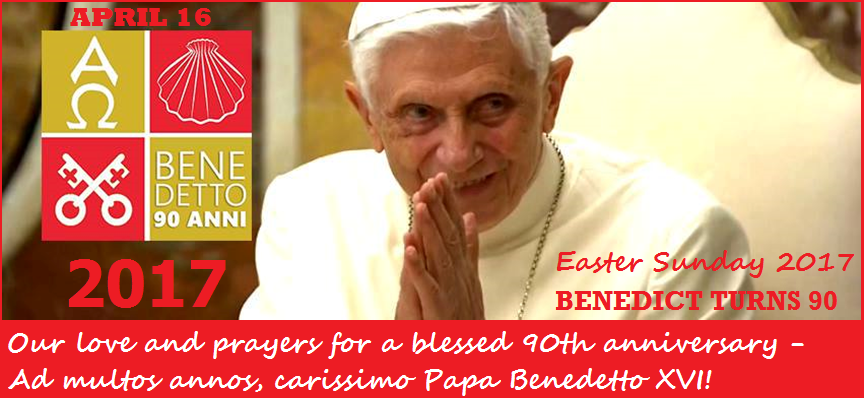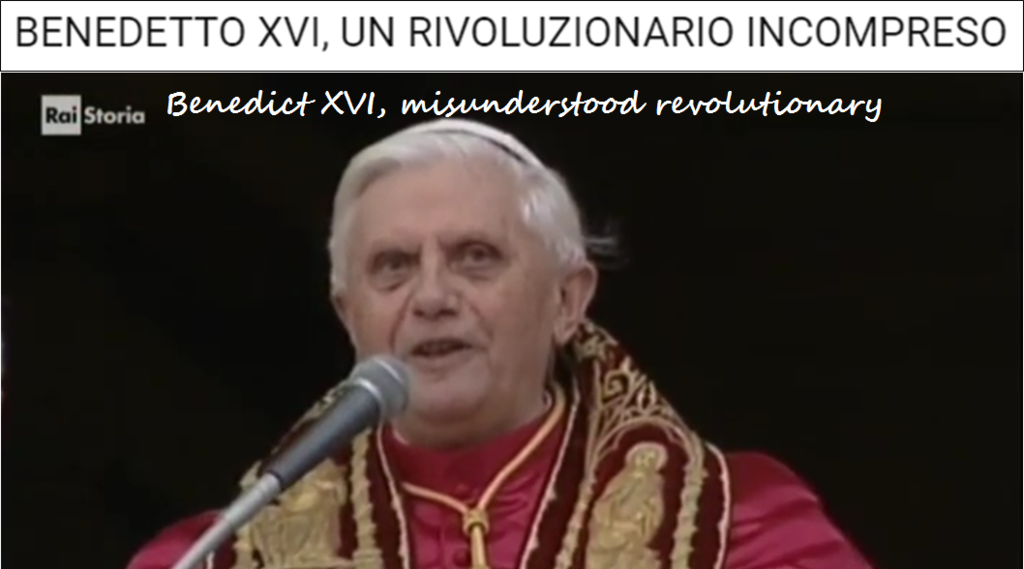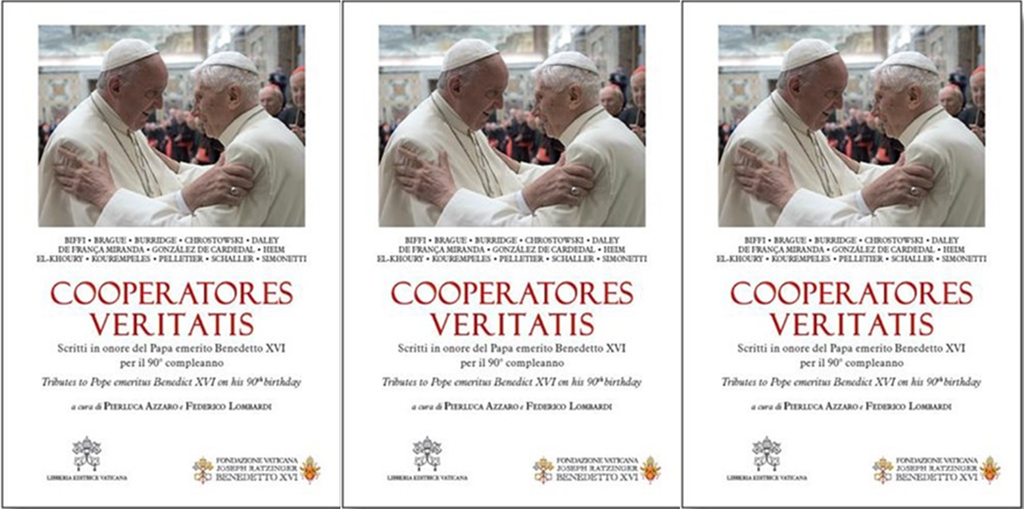 I am frankly surprised - most pleasantly and gratefully - at this initiative from RAI....
Italian state TV produces
I am frankly surprised - most pleasantly and gratefully - at this initiative from RAI....
Italian state TV produces
a tribute to Benedict XVI
on his 90th birthday

On the occasion of the 90th birthday this month of Emeritus Pope Benedict XVI, RAI-Cultura is presenting a special documentary “Benedetto XVI un rivoluzionario incompreso”, which first aired on Tuesday, April 4 and will air again on Tuesday, April, 11 on RAI-Storia.
The full documentary can be accessed on this page by clicking on the video image:
http://www.raistoria.rai.it/articoli/benedetto-xvi-un-rivoluzionario-incompreso/36908/default.aspx
To understand the papacy of Joseph Ratzinger, the documentary takes off from his revolutionary gesture of renouncing the office, a move he had meditated and prayed upon for some time and which he announced on February 11, 2013. Why did he do so on the Feast of Our Lady of Lourdes, which is a day now dedicated by the Church as a worldwide day of prayer for the sick? Why did he announce this at a routine consistory of cardinals present in Rome? And why did he decided to live out his retirement in a monastery within the Vatican?
Resource persons who speak in the documentary, which uses material from the RAI archives, includes historians Elio Guerriero, Andrea Riccardi and Don Roberto Regoli [both Guerriero and Regoli wrote post-retirement biographies of Benedict XVI], Vaticanistas AndreaTornielli and Sandro Magister, Cardinals Gerard Ludwig Muller and Gianfranco Ravasi, Fr. Federico Lombardi, Antonio Paolucci (former director of the Vatican Museums) and Joaquin Navarro-Valls.
Benedict’s resignation was not an act or rebellion, nor devoid of pain and sorrow, but it was a prophetic gesture. Elio Guerriero underscores, “For him, it came naturally. He said to me, ‘I was a bit surprised myself because I had under-estimated the impact of what I did. Possibly an excessive impact”.
With his resignation, Benedict XVI in effect entrusted to his successor the legacy of his reformatory moves. Sandro Magister noted, “He placed his trust on whoever his successor would be as someone who would be able to govern the Church, a task which is tremendously demanding and one that he himself felt he no longer had the strength to continue doing.”
But the documentary also shows us Jospeh Ratzinger as the brilliant theologian who was a professor for a quarter-century at four German universities, then Archbishop of Munich-Freising, and Prefect of the Congregation for the Doctirne of the Faith for 23 years.
“He served John Paul II, and avoided public interviews, to keep the pope in focus. But he always supported the pope even in the cases where they did not have a completely identical viewpoint,” says Andrea Tornielli.
On April 19, 2005, when the cardinals elected the German theologian as John Paul II’s successor, they sent a message to the world – that it was, above all, in Europe, where the Church should begin to find herself.
“He gave two explanations for choosing Benedict as his papal name,” says Roberto Regoli. “First, because of Benedict XV who was the pope during the First World War, and then, of course, for St. Benedict of Norcia, father of medieval Western culture who had preserved it through his network of Benedictine monasteries. In which we can see the importance for Benedict XVI of the cultural roots of Europe”.
But the center of Benedict XVI’s entire pontificate was the crisis of the faith, insisting on the centrality and the beauty of faith in Christ, even writing the three-volume JESUS OF NAZARETH (in his private capacity as a theologian).
“It is an original and extraordinary event that a Pope wrote a Christology text,” says Cardinal Gerhard Mueller, “which is not only a classic in Christology, but one focused on the person of Jesus as we know him from Biblical testimony”.
In the eight years of his pontificate, in light and shadow, Benedict XVI taught and indicated important paths to salvation for everyone, believers and non-believers alike.
But there was no lack of misunderstanding and of difficult moments. Yet with courage and determination, the Pope confronted head-on the problem of clerical sex abuses without allowing himself to be discouraged by unwarranted criticisms from the media nor by episcopal inadequacies.
“Benedict XVI followed a very consistent path, “ says Fr. Hans Zollner, SJ, head of the Center for Child Protection begun under Papa Ratzinger. “He gave free rein to all the possible processes to confront the problem in order to condemn the culprits and help the victims, having met with many of these victims himself.”
“I believe that this [approach to the clerical sex abuse problem] will remain one of the great historical merits of his pontificate,” adds Fr. Federico Lombardi, “a time during which he gave an ineradicable contribution to the history of the Church in our time”.
Also contributing material to the documentary were KTO (the Frehcn Cahtolic TV channel), the Cortile dei Gentili, the Centro Televisivo Vaticano, the Biblioteca Ratzinger (Ratzinger Library based at the German College in the Vatican), the Fondazione Vaticana Joseph Ratzinger-Benedetto XVI, and the archive of l'Osservatoro Romano.
On her blog, Lella posted this after watching the documentary on Tuesday.
About the RAI documentary homage
to Benedict XVI on his 90th birthday

April 5, 2017
Dear friends, last night I watched the documentary of Pope Benedict produced by RAI-STORIA (for replay today, 4/5, at 9:25) – and my impression was decisively positive. Unfortunately, it was only one hour long, which did not allow for a detailed analysis of his pontificate.
Nonetheless, certain issues were confronted objectively: from the anti-Nazism of the fiture pope and his family to his collaborative relationship with John Paul II, to the strenuous fight against clerical sex abuse in the Church, along with beautiful images from the World Youth Day celebrations in Cologne and Madrid.
A very moving testimonial was by Prof. Antonio Paolucci, who was the director of the Vatican Museums in Benedict XVI’s time, who recalled the greatness – including cultural – of the now emeritus pope.
We can also see the beautiful description of Joseph Ratzinger by Sandro Magister, in effect, as a transparent man who always spoke clearly without uncertainties, reservations of hidden calculations. I agree completely.
Of course, the documentary is too short but we appreciate the initiative of RAI.
The only wrong note was a statement by the founder of a well-known community [Andrea Riccardi, founder of Sant’Egidio Community] - he still speaks of the Regensburg lecture as an error, and that is certainly too much!
I think that there are very few these days who have failed to appreciate the prophetic nature of that lecture. Indeed, he went so far as to say that the lecture caused a ‘divorce’ between public opinion and the pope. When was this ever so?
The ‘divorce’ was with the media (certainly not with the faithful), and not because of Regensburg, but because of the characteristics described by Magister: that Benedict XVI was always crystalline in word and thought, who had no fear of speaking clearly. And this annoyed many because he was at odds with the homologous and homogenizing way of thinking that ‘the world’ would impose on everyone.
Quite apart from that out-of-place statement, the documentary is well worth watching and re-watching.
Beatrice transcribed Magister’s statement from the documentary:
Benedict XVI as pope had to endure many criticisms, much controversy – unwarranted in most cases – which amounted to pitiless attacks. But he was a much-beloved pope, much more than most people think. The impression this pope left is that he was a man who always said what he meant – everything he said was without uncertainties, reservations or hidden calculations.
Lella also updated the list of recent books about Benedict XVI:
Mimmo Muolo, Il Papa del coraggio - Un profilo di Benedetto XVI, Ancora 2017
Cooperatores veritatis - Scritti in onore del Papa emerito Benedetto XVI per il 90° compleanno, Libreria Editrice Vaticana 2017
Giovan Battista Brunori, Benedetto XVI - Fede e profezia del primo Papa emerito nella storia, Paoline 2017
Benedetto XVI, Io credo - Le pagine più belle, San Paolo 2017
Card. Raymond Leo Burke, Card. Gerhard Ludwig Müller, Il Motu proprio «Summorum Pontificum» di S.S. Benedetto XVI. Volume 4 - Una speranza per tutta la Chiesa, Fede & Cultura 2017
[Note that in the first three months of 2017 alone, four books have been published about him.]
Benedetto XVI (Joseph Ratzinger), Opera Omnia "L'insegnamento del Concilio Vaticano II, Libreria Editrice Vaticana 2016
Benedetto XVI, Ultime conversazioni, with Peter Seewald, Garzanti

I must express my protest at the flyer issued for the presentation of the Festschrift (commemorative publication) to mark the 90th birthday of Benedict XVI I hope it is not the book cover design as well. First, it is so blah it looks improvised, but most of all because the book has nothing to do at all, nothing whatsoever, with his successor, and I see no reason for the choice of the photograph. (Especially because Bergoglio is certainly no ‘cooperator in the truth’). And shame on those who run the Fondazione Vaticana JR-B16 that they agreed to this design and photo.
‘Cooperatores veritatis’:
A birthday gift for the Pope Emeritus

April 6, 2017
To mark Pope emeritus Benedict XVI's 90th birthday, the Fondazione Vaticana Joseph Ratzinger-Benedetto XVI has edited a special Festschrift volume of essays by Ratzinger Prize-winning theologians, which was presented on Thursday afternoon at the Augustinianum Patristic Institute of Rome
Titled Cooperatores veritatis: Tributes to Pope emeritus Benedict XVI on his 90th Birthday, assembled under the editorship of Pierluca Azzaro and Fr. Federico Lombardi, SJ, and published by the Vatican Publishing House, the volume is at once a testament to the profound influence of the thought of the Pope emeritus across intellectual disciplines, and a genuine contribution to scholarship and intellectual endeavour.
Its main title, Cooperatores veritatis [co-workers in the truth], is taken from Pope emeritus Benedict XVI’s episcopal motto.
In remarks to Vatican Radio ahead of the presentation, the President of the Ratzinger Foundation, Fr. Federico Lombardi SJ, explained that the choice of the motto as the volume’s main title encapsulates the life, work, and legacy of the man who became the 264th Successor to St. Peter.
“It is a[n episcopal] motto that came from his whole life prior [to consecration as a bishop], and represented his identity, his commitment as a theologian and as a servant of theology in the Church,” Fr. Lombardi said.
Joseph Ratzinger was born in the Bavarian town of Marktl on the morning of April 16th, 1927 – Holy Saturday of that year – and baptised the same day. He was ordained a priest in 1951, and was present at the II Vatican Council as a theological advisor to the Cardinal-Archbishop of Cologne, Josef Frings. He became Archbishop of Munich and Friesing in 1977, was made a Cardinal later that year, and participated in the two conclaves of 1978. He came to Rome in 1981 to head the Congregation for the Doctrine of the Faith, and served in that office until the death of Pope John Paul II in 2005, after which Joseph Cardinal Ratzinger was elected to the See of Peter and reigned from April 19th, 2005 until 8:00 PM Rome Time on February 28th, 2013.
In retirement, he lives a live of quiet prayer in a refurbished monastery within the walls of Vatican City.
Cooperatores veritatis brings together contributions from Msgr. Inos Biffi, the French philosopher Rémi Brague, the Anglican Biblicist Richard Burridge, the Polish theologian Msgr. Waldemar Chrostowski, the American Jesuit Brian E. Daley, the Brazilian Jesuit Mario De França Miranda, the Spanish theologian Olegario González de Cardedal, the Cistercian abbot of Heiligenkreuz in Austria Maximilian Heim, the Lebanese scholar Nabil el-Khoury, the Greek theologian Ioannis Kourempeles, the French theologian Anne-Marie Pelletier, the German theologian Christian Schaller [actual editor of the Opera Omnia of Joseph Ratzinger, published by the Regensburg-based Institut Papst Benedikt XVI headed by Cardinal Gerhard Mueller, nominal publisher of the series], and the Italian patristics scholar Manlio Simonetti.



[Modificato da TERESA BENEDETTA 07/04/2017 04:10]